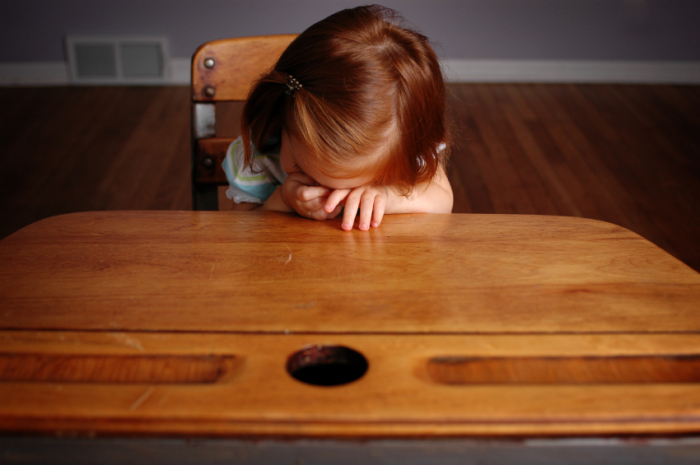
Symptoms of childhood anxiety can be any sign of behaviours that seem excessive – too much crying, gut problems, problems with potty-training, disproportionate sibling rivalry, passivity, being too-good, being demanding, sleep problems, a return to bed-wetting, hand washing or other repetitive disorders, lying, stealing, sulking, anger – the list is long. Anxiety takes as many forms as there are people, each of us feeling things in a way that is unique to us, but there are universal distresses too.
These can be incidental, for example a child reacting to slipping under the bath water or the barking of a big dog, and repeating the fearful response the next time. Or they can be more irrational, anxieties hidden in the unconscious which can be triggered by seemingly unrelated events or even by no event at all; these are anxieties which relate to the fundamental universal feelings – guilty feelings, angry feelings, sad feelings.
Children tend to be ego-centric (or narcissistic), which means they relate things to themselves as the starting point; when the child has a sense that his/her primary significant others appear predominantly upset, angry, depressed, sad, critical… the child will experience the world as a scary place, and come to feel responsible, that it must be because of something they are doing wrong, or even worse, being the wrong child, the child who can’t make mummy or daddy better/happy, the child who isn’t good enough.
Then there are the developmental tasks, such as negotiating the Oedipal stage. This starts earlier than most of us think, somewhere in toddlerhood and well into primary school years. In a very simplistic nutshell, it’s a normal transition of love from the first idealised love-object (mum) to dad and then back again, eventually finding a replacement love-object in friends, other role-models (for example school-years crushes on teachers), and then a partner. During this development of love-attachments, there is also the developmental task, again usually totally worked through in the unconscious, of moving from the concrete thought-processes of idealising (or vilifying) those who are beloved, to a more mature, balanced acceptance that life and loving is more complicated than ‘black and white’, ‘good or bad’, it is a mixture of feelings and attitudes, checks and balances.
These are ongoing emotional tasks that we all have to negotiate, some finding them easier than others. It can be during these processes that things can get stuck, go wrong, get muddled up, and deep-seated anxiety sets in: for example, children can become subliminally guilty at ‘betraying’ mum when they prefer to run to dad (or vice versa) and fear retaliation from the other parent.
The child will also be projecting his or her own subconscious negative feelings onto the parents, and siblings, believing that those very same feelings are coming from the more powerful parent/sibling and therefore there will be a negative outcome. We all project, of course, particularly when we are trying to deal with difficult feelings like rage, jealousy, rivalry, hatred: it’s emotionally safer to believe that those horrible feelings are inside someone else – but then the result is that we fear those feelings can do damage if they come right back at us!
Needless to say, all this can often produce a huge amount of anxiety. And it’s not just that the child is projecting his or her own feelings, they are also dealing with the projected emotions from the parent towards the child. Many anxieties within parents too, get translated into seeing the child as “difficult”, or “fretful”, or “rebellious”, when the origin of the feelings was within the parent who cannot accept his or her own disagreeable reactions to the task of parenting.
If by now you are feeling somewhat anxious from reading all this: the good news is that ordinarily “good-enough” parents help their child overcome their deeply –seated anxieties, by reacting to even the most testing situations that arise so often in parenting and life, with self-control, empathy, and loving reassurance towards their children. And even when patience is lost, and things get fraught and parents end up behaving like the overtaxed child for a little while, then perhaps the most repairing thing is to feel, and say, “sorry”. Even a very small baby will pick up on the reparative sense coming from a parent who a few moments ago felt very negatively towards this demanding little terror; and perhaps one of the most fundamental gifts we can learn about life and surviving anxieties is that distress happens, whether from within our relationships or from a more external force, and we can and do recover. It’s not what upsets us, it’s how we react that is significant to our ability to re-find calm and hope.
Soothe, explain, empathise and support your child through his or her anxieties, and that child will learn to trust that life is not only survivable but a challenging and creative set of experiences well worth the effort!
Article by Virginia Mallin
Leave a Reply
You must be logged in to post a comment.